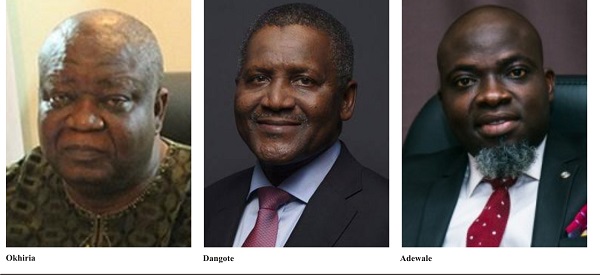Port Access Roads: Major Obstacle To Executive Order On Ports
By Kenneth Jukpor
It’s over a month since the Vice President issued the executive order on ports and stakeholders have continued to highlight several reasons why the order may not work. However, one issue which continues to feature in most people’s appraisal of the directive is the deplorable state of the port access roads.
The route from Coconut down to Tin Can, as well as the adjoining road from the Ijora axis into Apapa epitomizes national disaster. The thought of plying these routes on a daily basis causes heartache to the users of the port and those who reside or do businesses around the port premises.
However, given the amount of revenue that the Federal Government generates from the two major ports; Tin Can port and Apapa port, the road infrastructure should never have gotten to the level it is at the moment, in terms of accessibility to the ports.
According to Dr. Taiwo Afolabi, Group Executive Vice Chairman, SIFAX Group, the Ease of Doing Business initiative by the government is a welcome development due to the needless bottleneck encountered in the service delivery process, though he noted that the problem of infrastructure deficiency should be urgently addressed in order to compliment the executive orders signed recently by the Acting President, Prof. Yemi Osinbajo.
Citing the case of the Apapa access roads that have literally broken down and are source of concern for all business stakeholders, Afolabi said fixing the roads would not only aid the initiative but also bring relief and order to one of the country’s economic gateways.
He said: “The Ease of Doing Business executive orders are good and brilliant initiatives to improve the customer experience, particularly at the nation’s points of entry. I want to commend the government for it. However, I want to submit that the initiative should be an all-encompassing one, where other hindering factors, especially critical infrastructure, are attended to without delay.
“Take for instance, the Apapa ports. There is no way a customer experience can be improved when the importers and exporters find it extremely difficult to transport their goods in and out of the ports because the roads are in a sorry state. Containers fall on these roads on a daily basis with attendant losses. Workers, residents and business owners in the area are not finding things easy as well.
“My appeal to the government is to do a thorough review of other inhibiting factors to doing business in Nigeria and immediately tackle such issues with the urgency with which the Abuja airport’s faulty runway was fixed. Only then we will truly improve the customer experience in the country,”
Meanwhile, the Acting President of the National Council of Managing Directors of Licensed Customs Agents (NCMDLCA) Mr. Ben Ndee told our correspondence that the Minister of Works, Power and Housing, Mr. Babatunde Fashola should resign if he couldn’t fix the port access roads.
“The irony of the dilapidated port access road is that the former Governor of Lagos State, Mr. Babatunde Fashola is the Minister of Works. The former Lagos State governor criticized the Federal Government on the shambolic state of the Lagos port roads but today he is in the position to change things and he hasn’t. If Fashola cannot fix this road, I bet nobody can. It is a shame and I suggest that he should resign in shame and tell the world why the roads can’t be fixed.”
“How do we enhance the ease of doing business at the nation’s ports when one can’t access the ports? Everyday one is faced with the challenge of how to get into Apapa. We can no longer drive to Apapa, you either take a bike, trek or face the uncertainty of a commercial bus. The road from Coconut to Tin can has collapsed as a result of the flood. If you have to take a motorcycle you would have to do devotional prayers so that you don’t fall-off the motorcycle.
“How do you exit cargoes from the port under such conditions? These ports are yielding the enormous revenue and over the years government has been collecting the 7% surcharge that is meant for the maintenance of port infrastructure which should include the port access roads. What has the government done with the billions that have been collected over the years? Why have the port roads been allowed to decay to the point that containers fall on daily basis? What kind of port reforms are we doing?” Ndee queried.
He advised the Acting President, Yemi Osinbajo to disguise himself and pay a visit to the Apapa and Tin Can ports. “II am willing to take the Vice President round the ports to see things he may not know about. He would be amazed to see the decayed port infrastructure and the volume of corruption in the system especially by government agencies.”
Ndee also lamented that the norm for port reforms is “to hold stakeholders’ conferences just to take launch and dinner, waste government revenue on hiring exotic halls in the best hotels. The executive order is a product of one of those meetings but I can assure you that it wouldn’t work. Other countries are on single window even in neighbouring Republic of Benin. Can that happen in Nigeria? Can SON have that synergy with Customs? Can NPA be on the same page with the concessionaires and shipping companies? It is in Nigeria that the police write letters to the shipping companies to stop them from releasing a container until they (police) are settled.”
On his part, maritime analyst, Mr. Galtima Liman noted that it is possible to achieve 24 hours port operations in Nigeria as well as other factors in the executive order. However, he also said that fixing the port access roads would be key to the actualization of the executive order.
“The executive order is quite commendable but there are basic things that have to be put in place for it to succeed. The most important thing is the road infrastructure of the port access roads. Even the expressways linking the West to the East are in deplorable conditions. We need to construct new roads especially for the ports and the ruling government has a little over a year to deliver on this crucial mandate. These are simple but crucial factors that would enable the executive order thrive.” Galtima said.
On corruption, the order stated that, “Any official caught soliciting or receiving bribes from passengers or other port users shall be subject to immediate removal from post and disciplinary as well as criminal proceedings in line with extant laws and regulations”
Reacting to this, Mr. Anslem Nwadike, a retired Comptroller of the Nigeria Customs Service and former Customs Area Controller, Kirikiri Lighter Command (KLT) asked; Is corruption only embezzling money? When you create a system that encourages people to steal easily, haven’t you created, nurtured and groomed corruption? Can’t you be said to be corrupt for creating such a system purposely and putting allies in such positions?
“The issue of corruption at the ports is a reflection of the Nigerian society which celebrates materialism other than performance and effectiveness of a public servant.” Anslem noted.
It has become glaring that with the state of the nation’s port access roads no effort to facilitate businesses at the ports would be efficient and enduring. However, what is needed at the Apapa port isn’t mere palliatives because the bridges vibrate whenever heavy trucks pass. There would be need for the Federal Government to back the executive order with the corresponding will and funding to get a construction company working on the road with specific timelines to complete the reconstruction.
It only took six weeks to complete the Abuja Airport runaway repairs because the government was willing to fix it. The onus rests on the Federal Government to prove that it has the will to get the job done. The government only requires the same determination it used to sign the executive order to effect the needed changes and the nation’s port sector could be on its way to complete transformation.







